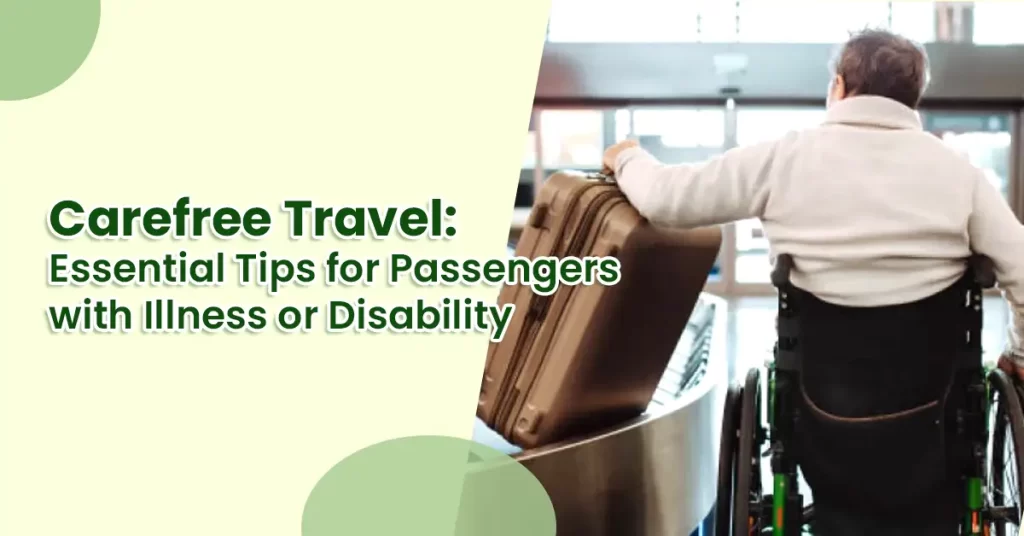Travel can be the greatest joy for some people and the worst part of their lives. We are talking about people who suffer from any kind of illness or disability and whose travel is often filled with unique challenges. For us, flying on air is a type of experience we would want every now and then for fun. However, it can be utterly challenging for individuals flying with a medical condition.
In this guide, we have covered every aspect of a smooth journey for people with disabilities or sickness. As travel is a necessary part of our lives, we aim to offer an accessible trip to everyone with ease and confidence. Whether you need to fly with a medical condition or you have any health issues, you can follow in the footsteps of this blog and have a safe air journey.
If you are flying with a medical condition, call Tours N Travel Pro for immediate assistance. Dial +1-844-402-8105 and get in touch with airline representatives who can help you make arrangements and get assistance for your upcoming flight.
Flying With A Disability?
Let’s Prepare You For Accessible Air Travel
Understanding Your Rights and Preparing for Your Journey
First, disabled passengers must know their rights and the laws that protect them. The Air Carrier Access Act (ACAA) safeguards travellers with disabilities from airline discrimination. The U.S. Department of Transportation enforces the law for all flights to, from, or within the continent.
Therefore, Airlines must assist passengers by providing proper help with boarding, off-boarding, and making connections. You will also get appropriate seating help and support for assistive devices.
The DOT offers resources like the Airline Passengers with Disabilities Bill of Rights to help passengers understand their rights and provides training for airline staff. These are the following help you can request your airline to provide assistance:
- for accessible seating
- for wheelchair services
- for onboard medical oxygen
- for portable oxygen concentrators
- for Service animals
- travelling with a cognitive disability
- travelling with medical equipment
Who can receive air travel assistance?
Passengers with disabilities and medical conditions that require special assistance are those with physical or mental limitations that affect their daily activities. This group may have hearing or vision impairments, mobility issues, or might need medical assistance.
Disabilities like:
- Physical or mental impairments: Problems that prevent them from daily activities like walking or hearing.
- Mobility impairments: difficulty in moving, even with wheelchairs.
- Hearing and vision issues: Problems like deafness or blindness.
- Cognitive or developmental disabilities: Conditions that affect their ability to think and communicate.
Medical Problems:
- Recent Surgery or Sickness: needing special care in-flight.
- Unstable medical conditions: issues that could get worse and need supervision.
- Needing medical equipment: Devices like oxygen or stretchers are required.
- Needing Medical Escort: Require a professional for care.
Travel Documents You Will Need
You must gather all the necessary medical travel documents to ensure a smooth travel. These may include:
- A written note from your doctor describing your medical condition and your special requirements.
- Multiple copies of your prescriptions for medicines you will be carrying on board.
- Your travel insurance details, including international coverage if going abroad.
Make sure you have these documents handy, in both digital and paper forms, so that they are easily accessible when needed.
Travel Tips for Booking Flights for Disabled
When booking your flight, it’s crucial to communicate your needs clearly with the airline. Here are some special needs travel tips:
1. Inform your Airline: When you need to travel, connect with the airline directly when booking your flight. Tell them about your disability and airport assistance you will require, such as wheelchair support, boarding assistance, airport navigation. They will help you out with the complete procedures. You may dial +1-844-402-8105 and talk to the airline representatives instantly.
2. Request for Airline Wheelchair Assistance: It is a complimentary service for disabled travellers to get wheelchair assistance, but it is better to request it in advance. Thus ensuring that you get timely support from the moment you reach the Airport.
3. Pick the Right Seat: For a disabled passengers, it is good to select a seat that has better accessibility. If you need extra legroom or the ability to access the aisle, you can book a seat in the bulkhead rows. You may also ask the airline to assign you the seats designated for disabled passengers.
4. Choose an Accessible Aircraft: Also, ask you airlines for an accessible aircraft. Aircraft are designed with special features to provide easy accessibility to the disabled passengers. Pick the one that has spacious lavatories and easy aisle access.
Preparing for Airport Procedures
- Self-Identification: You can self-identify yourself at the gate and specify that you need assistance for priority boarding. You should prefer having a TSA Notification Card. It will be of help.
- Assistance: At the airport, you will be provided assistance from trained airline personnel who will promptly help you with timely boarding and de-boarding.
- Wheelchair Assistance: You have the right to ask for a wheelchair. You will receive assistance in moving to and from seats, and a lifting device will be provided to assist you with limited mobility safely on and off the aircraft.
- Priority Boarding: For passengers with disabilities, airlines offer pre-boarding facilities which gives them more time to get settles in the plane.
- Assistive Devices: Airlines must assist with loading and stowing assistive devices.
- Travel Partner Allowance: Passengers are also allowed to have a travel companion pre-board with them.
- Be Informed about the Boarding Process: Airlines also make pre-boarding announcements for customers with a medical condition or disability before the general boarding starts. Thus allow you to board at priority.
Getting Along With TSA Medical Screening
TSA Cares helps travellers with disabilities or medical conditions during security screening. Transportation Security Administration (TSA) medical screening procedures must be known to you to ensure your security. Here are a few tips that will ease this process:
- Call TSA Cares: Reach out at (855) 787-2227 or fill out the online form at least 72 hours prior to your trip.
- Inform the TSA Agent: Upon reaching the security checkpoint, communicate with the agent about your medical condition. Thus, you can get a more personalized screening process.
- Prepare for TSA Screening: Carry a letter from your doctor that describes your medical issues and devices you may need onboard (e.g. insulin pumps, prosthetics). This will help clarify your needs during screening.
- Keep your Medicines Handy: Pack your medicines in your carry-on bag and pack it in their original containers to avoid spoilage or spillage. Also, remain complaint with the TSA regulations.
- TSA Disability Notification Card: Download the card from the TSA website to discreetly inform the officers about your needs.
Travel Tips For Disabled At the Airport
After you have passed through the security protocols, there are a few things you can do to keep yourself calm and active for your flight:
- Use the Airport Lounges: If your ticket includes lounge access, you must utilize it. You can get additional assistance if needed at the lounges, plus enjoy more comfortable setting to wait for your flight.
- Have your meal before taking off: Food options at the Airport might be limited, especially for those who have dietary restrictions. Therefore, plan and eat properly before boarding the plane. Thus, you will remain comfortable and sound during the trip.
- Stay Hydrated: Drink enough water to stay hydrates and minimize your health issues in air. You can have a water bottle handy.
In-Flight Accessibility
To maximize your comfort onboard, you should:
- Talk to the Airline Crew and Express Your Needs: When you are settled in plane, discuss your need with the flight attendants so that they can assist you whenever you need.
- Request Assistance to Use the Restrooms: You can call for help to access the lavatory from the flight crew.
- Consider your Flight length: On long haul flights, take in-flight breaks to stretch and move a bit if your health allows. This will add up to your overall comfort.
Health Advice While Traveling
If you or your travel companion has a medical problem, maintaining health while flying is really important. You can use some tips to make it up:
- Take your medicines: Follow your regular medication schedule as much as possible. As you are flying to another place, you must consider the time zone changes for your medicine schedule. Set alarms on your device to remind you when it’s time to take the dose.
- Stock Up your Health Essentials: Pack your carry-on luggage effectively and put extra medicines, just in case you need them, and bandages or other medical devices.
- Know Where you can find medical support: You must research the health facilities near your destination before you travel. Have your list of emergency contacts ready and know where to run if need arises. This will boost your confidence while travelling.
Talk To Accessible Travel Experts At Tours N Travel Pro!
Having the complete knowledge of the security procedures and the right assistance through airlines makes all the difference for passengers with disability or medical conditions. Make sure you communicate everything with your airline and pack your travel essentials, including documents, medicines and any medical devices you need.
Book an Accessible Air Travel with Tours N Travel Pro professionals. Dial +1-844-402-8105 and don’t feel any burden of hectic journey. We can help you make it the most comfortable experience you ever had and will keep on having with our end-to-end support.
Frequently Asked Questions
Disabled people can use the accessibility maps and applications such as Wheelmap, Google Maps (accessibility feature), and AccessNow to find accessible places. You can also book special assistance from Airlines. This will allow you to get help in boarding, deplaning and wheelchair assistance.
The TSA Hidden Disability card, or TSA Notification Card, is a free tool for travellers with disabilities and medical conditions that helps inform TSA officers or airport security about their condition. Therefore, they can get help in the security screening process.
Yes, travellers with disabilities who require more time and assistance to board the plane are offered priority boarding. Thus, helping them stow the accessibility equipment and be seated comfortably. Some airlines also make special announcements for disable passengers to reach the boarding area before everyone else.
If you have had a recent heart stroke, attack, operation or injury, you should refrain from flying. Also, conditions like Angina Pectoris, Bipolar disease, Cardiac valve replacement, and coronary heart diseases, whether treated or untreated, prevent passengers from flying.
You should seek a doctor to discuss your travel and health plans. Explain why you would be unable to fly and need a medical certificate for your medical reasons. Your doctor will recommend what is better for you, whether you are fit to travel or not. If they suggest that you shouldn’t fly, ask them to provide a letter for that.
The most disability friendly is the Delta Airlines. Recognized for their commitment to providing the best accessibility services and customer service to passengers with some sort of disability. Other airlines known for their disability assistance are Southwest, Air New Zealand, Qantas, and Emirates.
Yes, airlines offer services like onboard wheelchair and stowing/retrieving carry-on items. The onboard chair designed in the aircraft easily fit in the aisles and lavatories. As these wheelchairs can only be used with the flight attendant assistance, they offer help throughout your time on the plane.












